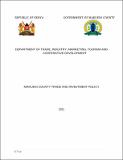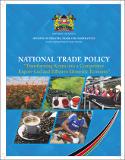Discussion Paper No. 306 of 2023 on The Implications of the African Continental Free Trade Area (AfCFTA): Evidence from Partial Equilibrium Model on Kenya
Publication Date
2023Author
Type
KIPPRA Publicationsviews
downloads
Metadata
Show full item recordBy
Malot, Kenneth KNandelenga, Martin W.
Abstract/
This study aims to provide policy makers with a clear understanding of the short-term impacts of tariff liberalization within the framework of the African Continental Free Trade Area (AfCFTA) on the Kenyan economy. The study used the TRIST model to analyze the effects of AfCFTA on Kenya's revenue, price effects, trade dynamics, and overall welfare. It focuses on determining the impact of AfCFTA on the revenue effects, tariff and price impacts, welfare effects, and the influence on trade, both imports and exports using the 2021 disaggregated trade data. The findings indicate that tariff liberalization leads to a substantial decline in tariff revenue for Kenya, with an average potential loss of Ksh 22.53 billion. Additionally, there is a marginal increase of around 0.1 per cent in imports from African nations in sectors such as manufacturing dairy products and growing crops. At the same time, exports will expand within the region, particularly in countries where Kenya lacked functional trade agreements. Notably, sectors such as dairy product manufacturing experience a 0.02 per cent reduction in protectionism. Tariff liberalization significantly lowers the prices of imported products, especially in categories such as other service activities and manufactured items. The findings also show improved welfare, with the highest welfare effects observed in categories such as motor cars and other motor vehicles. Based on the findings, policy makers should develop strategic measures for revenue diversification to mitigate revenue loss. Tailored interventions are needed to protect sensitive sectors. Strengthening domestic industries is vital for the country to fully realize the AfCFTA's benefits. Ongoing monitoring of trade dynamics within AfCFTA is crucial for adapting to evolving conditions and optimizing opportunities. Additionally, robust consumer protection measures and transparent pricing are essential for shielding consumers from adverse impacts, fostering trust, and ensuring the long-term success of AfCFTA's transformative potential.
Subject/
Free Trade Area; Trade Performance; Price Effects; Sector Protection Effects; Absolute Advantage Theory
Publisher
The Kenya Institute for Public Policy Research and Analysis (KIPPRA)Series
DP/306/2023;Collections
- Discussion Papers [346]
Related items
Showing items related by title, author, creator and subject.
-
Makueni County Arts, Trade and Investment Policy 2022
County Government of Makueni (County Government of Makueni, 2022)Trade and investment play a significant role in a country’s growth and development through their linkages with all the sectors of the economy by creating markets through which goods and services get to the consumer. Trade ... -
National Trade Policy “Transforming Kenya into a Competitive Export-Led and Efficient Domestic Economy”
Ministry of Industry, Trade and Cooperatives State Department for Trade (Ministry of Industry, Trade and Cooperatives State Department for Trade, 2017)The National Trade Policy of Kenya has been developed to address the changing landscape of governance and trade in the country, including devolution and the need to re-emphasize the role of trade in reducing poverty and ... -
Discussion Paper No. 304 of 2023 on Leveraging the African Continental Free Trade Area to Expand Kenya’s Trade in Africa
Malot, Kenneth (The Kenya Institute for Public Policy Research and Analysis (KIPPRA), 2023)The African Continental Free Trade Area (AfCFTA) has experienced substantial growth, prompting the exploration of the key factors driving this expansion. In response to this dynamic landscape, this study seeks to provide ...




